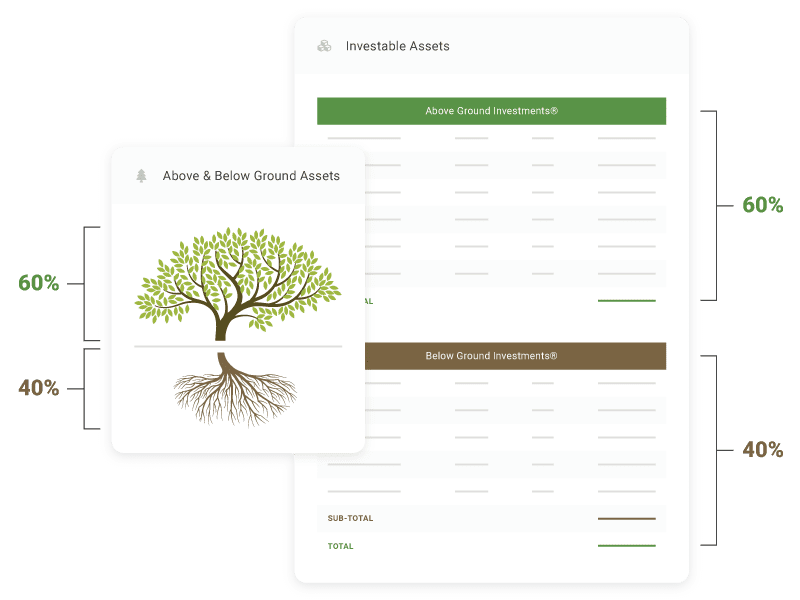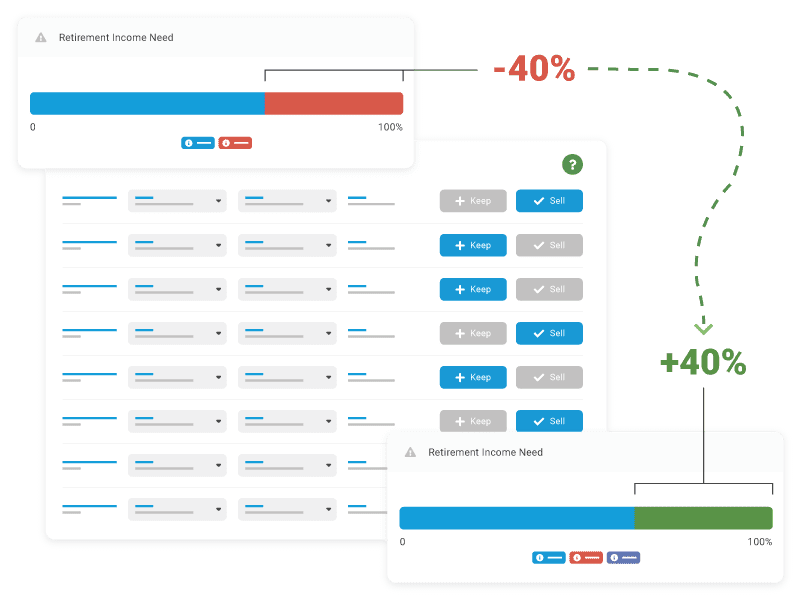When most people think of the word “estate,” they think of a large house on acres of land. However, the legal definition of an estate is much more complicated than that. In short, an estate is everything that you own—including your house, car, bank accounts, investments, and personal belongings.
If you were to die tomorrow, your estate would be everything you leave behind. Your family would be responsible for distributing your assets according to your wishes (as laid out in your will or trust), paying any debts and wealth transfer tax that is owed, as well as wrapping up any other loose ends.
Since your estate is comprised of all of your assets, and it’s likely you wish to transfer these assets to your loved ones rather than the state or federal government, it’s important to have a plan in place for what will happen upon your passing. This is where estate planning comes in.

Why is estate planning important? – Kaizen Wealth
Why is Estate Planning Important?
Without an estate plan in place, your assets can be distributed according to state law—which may not be in line with your wishes.
In our in-depth article What is Estate Planning, we discuss what an estate plan is and how to make it work for you. However, for a quick example, say you have a son and a daughter. You may want to leave your house to your son and give your daughter cash instead. If you don’t have a will or trust in place specifying this, the state may decide to split your assets equally between the two of them—leaving them in a situation where the state will have to figure out who gets what from the house and who gets what amount of cash.
Estate planning can also help minimize the amount of taxes owed by your heirs after you die. By taking advantage of certain strategies —such as giving gifts during life, setting up a trust, or qualifying for an estate tax exclusion—you can minimize the amount of taxes that will be owed on your estate after you die.

What taxes can have an impact on your estate? – Kaizen Wealth
What Taxes Impact Your Estate?
Despite what you may have heard, the estate tax is not a thing of the past. When you pass, your taxable estate is the sum total of all of your assets minus your liabilities. What is the definition of estate tax? It’s a tax imposed on the assets in your estate when you die.
These taxes can have a significant impact on the value of your estate and the amount of money your heirs receive. Unfortunately, and especially when dealing with the passing of a loved one, estate tax is often one of the last things people think about. Here’s what you need to know about estate taxes and how to minimize their impact.
Income Tax
Income tax is a tax that is levied on the income of individuals and businesses. The amount of tax you pay can depend on your income level and the country in which you reside. In most countries, income tax is progressive, which means that the higher your income, the higher percentage of tax you can pay.
For individuals, income tax is usually paid through payroll deductions. For businesses, income tax is typically paid quarterly or annually. Regarding estate planning, income tax is applied to any revenue generated from the assets in your estate.
State and Federal Estate Tax
Federal estate tax (otherwise known as death tax) is levied on the value of an individual’s assets at the time of their death, minus any debts and expenses. The amount of inheritance tax you pay is usually determined by the value of your assets and the country or state in which you reside. In most countries, estate tax is progressive, which means that the higher the value of your assets, the higher percentage of tax you can pay.
In the United States, “most relatively simple estates (cash, publicly traded securities, small amounts of other easily valued assets, and no special deductions or elections, or jointly held property) do not require the filing of an estate tax return.” However, you can find a table for the filing threshold each year here on IRS.gov.
If taxes are owed, paying the estate tax is usually up to the executor of the individual’s estate. It’s also important to note that, although you may be exempt from federal estate taxes, you may still owe estate tax state to the state in which you reside. If you have any questions as to the estate tax laws in your state, reach out to Kaizen Wealth Management and we’d be happy to help.

There are many types of taxes that can impact your estate – Kaizen Wealth
Gift Tax
A gift tax is a tax that is levied on gifts given by individuals. In this case, the gift is anything of value that is transferred from one party to another without anything expected in return. The amount of tax you pay is usually based on the value of the gift and the country in which you reside. One of the similarities between estate and gift taxes is they are both progressive; again, the higher the gift’s value, the more taxes will be paid. However, unlike estate tax, this tax is typically paid by the donor of a gift. What’s more, the tax applies regardless of whether the transfer was intended as a gift.
Inheritance Tax
One final tax that is often overlooked is the inheritance tax, which is a tax levied against the value of the overall assets that a person inherits. The key difference between estate and inheritance taxes is that inheritance taxes are not a federal tax but rather a state tax, and it is currently only applied in seven states.
Minimizing the Impact of Taxes on Your Estate
Most people want to preserve the value of their assets so they can maximize the amount passed to their loved ones. Unfortunately, estate tax can take a significant bite out of an inheritance, leaving less money for your loved ones. There are, however, a few strategies you can use to minimize the amount of inheritance taxes you’ll owe.
Giving Gifts
One way to reduce the amount of taxes you’ll owe on your estate is to give gifts during your lifetime. With the gift tax exemption, the Internal Revenue Service states that you can give up to $16,000 per year (up from $15,000 in 2021) to as many people as you’d like without incurring any gift tax liability.If you’re married, you and your spouse can each give $16,000 per year, for a total of $32,000 per year.
Because this limit is per person and is not cumulative, this is an especially good strategy if you have a large family and significant assets. It’s also important to note the gift does not have to be extended to a person, as the gift tax exemption applies to political and charitable donations or funds paid to educational institutions.

3 things you can do to minimize the impact of taxes on your estate – Kaizen Wealth
Unified Tax Credit
Another way to reduce your estate tax liability is to take advantage of the unified tax credit. This credit is a federal estate tax exemption that allows you to shelter a certain amount of your assets from estate tax and essentially combines the inter vivos gifts (gifts made during your lifetime) with testamentary transfers (assets left upon your passing). The exact amount varies depending on the year, but for 2022 the Internal Revenue Service has set the limit to $12.06 million for taxpayers filing individually or $24.12 million for couples filing jointly. This means if your estate is valued at less than $12.06 million (individual) or $24.12 million (couple) you won’t owe any estate tax on it. Considering the large size of the exemption, the unified tax credit is especially beneficial if you own a business or other valuable assets.
Trust Funds
Finally, creating a trust fund is a great way to minimize estate tax. Trust funds can be used for a variety of purposes, including asset protection and estate tax minimization. When creating a trust fund, you can specify how the assets in the trust should be distributed upon your death. This gives you more control over who inherits what and can help minimize the amount of estate taxes owed on the inheritance. There are several different types of trusts that can be used for estate planning purposes. One type of trust, called a bypass trust, can be used to pass assets on to your spouse while still taking advantage of the unified credit. This type of trust can be complex, so it’s important to work with an experienced attorney or financial advisor to set it up correctly.
Ensuring a Smooth Transition
Now that you have a basic understanding of estate planning, estate taxes, and how to minimize their impact, you are on your way to ensuring a smoother transition of your assets to your loved ones.

A professional can help you ensure a smooth transition during estate planning – Kaizen Wealth
None of us wants to see everything we’ve worked so hard for getting left in the hands of the state. That’s why it’s important to have an estate plan in place so your assets will be distributed according to your wishes, and the value of those assets can be preserved for your loved ones.
As you can see, there are several different taxes that can impact the value of your estate, such as inheritance tax, and it’s important to be aware of them and the strategies you can use to minimize them. By using one or more of these strategies, you can help ensure that more of your hard-earned money goes to your loved ones instead of the government via federal estate tax. If you have any questions about how these taxes might apply to your specific situation, be sure to speak with a qualified professional.
If you don’t have an estate plan in place, now is the time to start creating one. Contact us today and we can help ensure that your plan is tailored to your unique circumstances and that it meets all of your goals.



